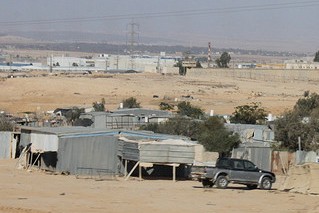 CC-BY-NC-SA: Michael-Shade
CC-BY-NC-SA: Michael-ShadeThe High Court of Justice handed down this afternoon (20.07.2014) a partial judgment on the petition for the provision of protection for Bedouin villages in the Negev. The court determined that it found no reason for an immediate intervention in the policy of protection for the communities. Nonetheless, the Justices held that the long term preparedness needed to be clarified, and gave the respondents 30 days to give their response.
In the ruling, Justices Yoram Danziger, Zvi Zylbertal and Noam Sohlberg remarked that there is no dispute concerning the supreme obligation of the state to protect the lives and physical integrity of its citizens, but that they found nothing wrong with the decision of the defence establishment not to erect portable shelters in the villages, and noted that they “felt confident that if the circumstances were to change in such a way as to justify the transferral of shelters to the villages – that the respondents would alter their position.”
The Justices further noted that they did not possess any data on the mode of operation of the Iron Dome Interception System (the Department of Defence did not provide any information to the court), yet they remarked that “we believe that the dispersal and operation of this system is based upon practical considerations with no weight given to the appearance or absence of any settlements on different maps.”
With regards to the claims about the infrastructure in the villages, the Justices decided that there was a reasonable argument to be considered, and so ordered the respondents – the Ministry of Defence and the Regional Councils, to provide their comments on the matter to the court within 30 days.
The petition to provide protection for Negev villages and communities was submitted by ACRI Attorneys Nisreen Alyan and Auni Banna on behalf of the residents of the Bedouin villages – including Omar Al Wakili from the village of Awajan, who is the uncle of Maram and Asil Wakili who were severely injured by falling rockets – in coordination with the Council of Unrecognized Villages in the Negev, Physicians for Human Rights – Israel, the Dukium Negev Coexistence Forum, Bimkom – Planners for Planning Rights and the Association for Civil Rights in Israel.
The petition explained that there are approximately 100,000 Bedouin residents living in Negev villages, most of whom reside in temporary shacks and huts. These structures provide no protection from falling rockets, and there are no bomb shelters or safe zones in the villages. Reports from the residents indicate that in most of the villages, sirens can not be heard prior to rocket attacks. This is especially concerning considering that the Iron Dome Interception System does not intercept rockets fired towards these villages – as was reported in the media.
Yesterday, 32 year old Auda al-Wadj was killed by a rocket attack. Four of his family members, including his 4 year old son and 3 month old daughter were wounded and taken to hospital. Last week, two young Bedouin girls – Maram and Asil Wakili, were severely injured by a falling rocket.
According to ACRI Attorney Nisreen Alyan: “Thousands of residents of Negev villages live in constant terror of rocket attacks – a fear that has come to pass and has caused physical and psychological harm. Alongside this existential fear is a sense of utter abandonment. Unfortunately, this is yet another instance of the growing alienation between these residents and state institutions”.
Additional Materials
To read the court’s judgment (in Hebrew), click here.
For further background on the petition, click here.
ACRI’s urgent request for an immediate judgment on the petition (submitted Sunday morning – 20.07.2014).







